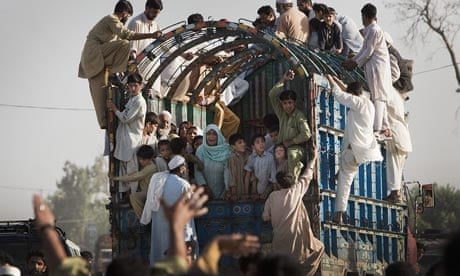The Pakistani army ordered residents to flee the Swat Valley during a lull in fighting , triggering a further exodus of frightened people and raising expectations of a significant ground offensive against the Taliban.
Miles of traffic jams snaked out of the war-torn valley as tens of thousands of people fled using all available means, from donkey-drawn carts to rickshaws.
In the battlezone the army said it had killed another 200 militants, most of them in a strike on a training camp in Shangla district and 55 in Swat. The fight is being closely watched from the US.
General David Petraeus, head of the US central command, ,warned that the Taliban posed a threat "to the very existence of the Pakistani state".
Petraeus said al-Qaida's central leadership had moved to Pakistan but he denied that generous military aid was linked to a possible US deployment. "This is not about us putting combat boots on the ground," he told Fox News.
The exodus out of Swat added to a humanitarian crisis that is rapidly swelling beyond earlier fears. Officials in Mardan, on the lowland plains below Swat, said that 250,000 people had registered for help, more than double the total on Friday.
Including 550,000 people displaced by earlier fighting, officials said they feared as many as 1.3 million people could soon be homeless in North West Frontier province. The aid group World Vision said it had found "intolerable" conditions in some of the six hastily opened camps, pointing to high temperatures and a lack of toilets and electricity.
The army said that between 12,000 and 15,000 security forces – regular army and paramilitary frontier corps – are stationed in Swat, pitted against between 4,000 and 5,000 Taliban guerrillas, the bulk of whom are concentrated in Mingora.
The the militants used the nine-hour pause in fighting to deepen their defences against an expected army ground offensive. In Kanju, a strategically important village beside the river Swat, fighters surrounded a police checkpoint near the army-controlled city airfield.
Further along, fighters sheltered under overhangs and thickets of trees to avoid being detected by helicopter gunships buzzing overhead. They warned residents to leave the area immediately.
Absent was the militants' leader, the charismatic preacher Maulana Fazlullah, who villagers speculated was hiding in the Tharan Valley, 10 miles to the west bordering Upper Dir district. Fazlullah continues, however, to make use of the FM radio broadcasts that helped him rise from obscurity two years ago, employing them to issue coded instructions to battlefield commanders and threats to perceived enemies.
The army launched a full-scale operation on Thursday, following the collapse of a fragile peace deal that saw militants fanning out of their Swat stronghold into neighbouring districts such as Buner and Dir. It was a fight "for the survival of the country", the prime minister, Yousaf Raza Gilani, said on Saturday. The offensive came as President Asif Ali Zardari visited the United States to reassure a nervous Obama administration that Pakistan was committed to fighting militancy.
The operation has also enjoyed an unusual level of support at home, even from conservative forces previously reluctant to criticise the Taliban.
A conference of religious clerics in Rawalpindi endorsed the military campaign as a "jihad against the enemies of Islam".
Turning points in public opinion included the release of a video showing a Taliban fighter flogging a teenage woman, and a declaration by Sufi Muhammad, a senior pro-Taliban cleric, that democracy was an "infidel" concept.
The provincial government had released the 78-year-old jihadi cleric from prison last year in the hope he would persuade the Taliban to lay down arms.
One of the few voices publicly opposing the campaign is the former cricketer Imran Khan, who leads a small party and has aligned himself with rightwing forces in recent years.
Allegations of Talibanistan in Frontier province were "nonsense", he told the Guardian.
"This whole thing is very sinister," he said, accusing the government of "setting up this idea that Islamabad was being threatened and the Taliban were coming with their way of life and cutting of throats".
Khan's stance has antagonised left-leaning Pakistanis. "He is very foolish," said Talat Masood, a retired general and analyst. "He is just trying to build up his image by criticising a military operation. But he is doing a great disservice to himself."
